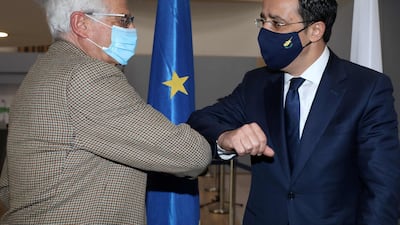When I first became interested in international relations the world was a radically different place. The Cold War was still on. This was a world divided into economic and political blocs. It was also an era marred by brutal proxy wars. The “superpower rivalry”, as it was known, between the US and the Soviet Union influenced co-operation between nation-states and their peoples. This dynamic shaped the world around us and it came to define how diplomacy was done.
This international order also dictated the role of a diplomat. During this time, diplomacy was based around conventional tools that prioritised the advancement of national interests, such as security and prosperity.
When the iron curtain fell, it ushered in a new international order – a post-Cold War era that has been one of co-operation, freedom of movement for people and the removal of barriers in international trade. When I started my career in diplomacy, it was obvious that diplomatic conventions were shifting from a focus on security and conflict resolution to broader themes focused on co-operation and development.
Fast forward to the present day, diplomacy has evolved even further, into something that intersects with, and even encompasses, trade, science, energy, resources, space, health care and environmental issues. Countries have had to adapt to this new order and so, too, have their diplomats.
Today, diplomats are not only required to be highly astute, but they must also possess an arsenal of multi-disciplinary skills. Soft skills are key. Working in an overseas mission is likely to expose diplomats to scenarios that require them to be flexible. They will most likely assume diverse, sometimes complex, roles. A diplomat could be required to assist high-profile political exchanges, co-ordinate a trade delegation or mediate during a political crisis. At the same time, they could be asked to comfort their own citizens during a personal emergency, be tasked with networking and building relationships with the local community, or even pitch in with admin work such as visa processing and passport renewals.
While communication, empathy, flexibility and tact are all useful skills to have for cross-cultural management, the modern diplomat must be both a good specialist and also a capable generalist. Obviously, this is no small ask, and it is perhaps why diplomatic training has long found it difficult to keep up. In some cases, it explains why it falls short entirely.
In my view, the best way to build these specialised skills is by having a focused and integrative learning approach. Diplomatic academies have now emerged as the best way to deliver this.
It would be unwise to assume that these specialised academies are a direct competitor or replacement to a traditional foreign ministry. Diplomatic academies actually serve to support the foreign policy objectives of the host country. They complement the existing system by combining academia, research and practice with a pioneering approach to equip future diplomats with the necessary knowledge and multi-disciplinary skills to serve their nation effectively on the international stage.
The diplomatic academy model allows for the delivery of this high-impact training as well as the dissemination of vital research that furthers the understanding of diplomacy and international relations.

These academies have the flexibility to combine learning experiences and practical application that can perhaps be missed in other settings. Moreover, many of these centres bring international expertise and experiences to equip aspiring diplomats to better deal with the scenarios they will likely encounter in the ever-changing world of foreign policy.
It is also worth noting that modern diplomacy is no longer confined to state-interest representation. Civil society and the general public are much more invested in foreign affairs. Moreover, the revolution in information and communication technologies provides more transparency to the public and gives average citizens the opportunity to engage with international relations.
Over the past couple of years, social media – and Twitter most of all – has become an increasingly prominent means of political and diplomatic communication. When I started my career, “hashtag diplomacy” or “Twiplomacy” was unthinkable, and the idea that heads of state and other dignitaries would regularly be compressing complex policy positions into posts of 280 characters or less was unimaginable.
There is, however, no denying that Twitter is a powerful tool for diplomats. It allows them to engage with local or diaspora communities where they are posted, and it has emerged as integral to the promotion of nation branding. Moreover, senior diplomats can also use Twitter to advocate causes, deliver practical information or, in some cases, challenge the media.
And diplomacy is also becoming a greater presence in other sectors. The natural resources and finance sectors, for instance, are global industries that transcend any one economy, but they also serve the national interest. Commercial diplomacy has become increasingly prevalent, as our world has grown more interconnected and globalised.
Part of the value of diplomatic academies is that they recognise that it is not only diplomats who need to have diplomatic skills. Some of the skills required to be a senior international oil and gas executive are in many ways no different than those needed to be the trade attache based at the embassy down the road.

Diplomatic academies have the ability to offer commercial executives the same level of training as they would diplomats. This can involve competencies such as negotiation techniques, etiquette and protocol, presentation, debate and reporting.
There is no denying that our world today faces a plethora of challenges. They require global co-operation. In modern times the role of diplomacy has never been so important. Diplomats need to be prepared to navigate these challenges. They also need to be ready to embark on new opportunities.
To go about the job of modern diplomacy, diplomats will need to be courageous, knowledgeable and disciplined. These are the types of abilities that can now only be provided effectively by specialised diplomatic training centres.
Bernardino Leon is director-general of the Anwar Gargash Diplomatic Academy in Abu Dhabi


